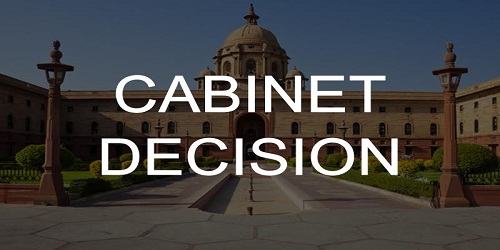On May 2, 2018, Union Cabinet chaired by Prime Minister Narendra Modi approved following initiatives:
 Cabinet approves Doubling of Investment Limit for Senior Citizens under Pradhan Mantri Vaya Vandan Yojana (PMVVY)
Cabinet approves Doubling of Investment Limit for Senior Citizens under Pradhan Mantri Vaya Vandan Yojana (PMVVY)
Union Cabinet has given its approval for doubling the investment limit under the Pradhan Mantri Vaya Vandan Yojana (PMVVY) from Rs 7.5 lakhs to Rs 15 lakhs.
- Subscription period for this scheme has also been extended from 4thMay 2018 to 31stMarch, 2020.
- Enhancement of investment limit will now enable Senior Citizens to get up to Rs.10000 Pension per month.
About Pradhan Mantri Vaya Vandan Yojana (PMVVY):
This scheme was launched with an objective to provide social security during old age and protect Senior Citizens (persons aged 60 years and above) against a future fall in their interest income due to uncertain market conditions.
- PMVVY is being implemented through Life Insurance Corporation of India (LIC).
- Under this scheme, senior citizens are provided an assured pension based on a guaranteed rate of return of 8% per annum for ten years.
Cabinet approves Mutual Recognition Agreement between the Institute of Chartered Accountants of India (ICAI) and the South African Institute of Chartered Accountants (SAICA)
Mutual Recognition Agreement (MRA) between ICAI and SAICA envisages establishment of a mutual co-operation framework for the advancement of accounting knowledge, advancing the interests of their respective members and positively contributing to the development of the accounting profession in both the countries.
- The agreement will facilitate recognition of Indian Accountancy Professionals with local Accountancy qualification in addition to existing ICAI qualification.
- This will open more professional avenues for Indian accountants.
- It will also increase mobility of accounting professionals between both the countries.
Cabinet approves Restructuring of the Indian Bureau of Mines (IBM)
Union Cabinet has approved the restructuring of the Indian Bureau of Mines (IBM) by upgradation, creation and abolition of certain Joint Secretary-level posts and above.
- IBM is engaged in promotion of conservation, scientific development of mineral resources and protection of environment in mines other than coal, petroleum & natural gas, atomic minerals and minor minerals.
- The restructuring has been resorted to in order to increase the efficiency of IBM by adopting Information Technology and space technology.
- Post restructuring, staff strength at Indian Bureau of Mines will remain same as earlier (1477).
Quick facts about Indian Bureau of Mines (IBM):
♦ Established in – 1948
♦ Headquarters – Nagpur, Maharashtra
♦ Parent entity – Department of Mines, Union Ministry of Mines
Cabinet approves Cadre review and formation of Group ‘A’ service of the technical cadre of Petroleum & Safety Organization (PESO)
The new service has been named Indian Petroleum & Explosives Safety Service (IPESS).
- This measure will enhance the capacity and efficiency of PESO and it will also enhance career progression of its Group ‘A’ officers.
- PESO is a subordinate office under Department of Industrial Policy & Promotion (DIPP), that is functioning as a nodal agency for regulating safety of substances such as explosives, compressed gases and petroleum since 1898.
Cabinet approves construction and operationalisation of 100 bedded General Hospital at Najafgarh, New Delhi
The Project envisages setting up of the 100 bedded General Hospital at Rural Health Training Centre (RHTC), Najafgarh, New Delhi for the local population of 13.65 Lakh spread across 73 villages.
- Staff of more than 30 doctors and 40 nurses and 50 Allied and Healthcare staff will be posted at this hospital.
- Services to be provided at this hospital: Diagnostic services and separate Out Patient Departments (OPD) for General Medicine, blood bank, surgery, dental, ENT, audiometry, Ophthalmology and paediatric care.
- The hospital will be constructed and operationalised at an estimated cost of Rs. 95 crore.
Cabinet approves accession to the Protocol under WHO Framework Convention on tobacco control to eliminate illicit trade in tobacco products
The protocol will be applicable to both – smoking and chewing or smokeless tobacco (SLT) forms – adopted under the World Health Organization Framework Convention on Tobacco Control (WHO FCTC).
- India is a party to WHO FCTC.
- Parties to WHO FCTC are obliged to adopt supply chain control measures licensing of manufacture of tobacco products and machinery for manufacturing of tobacco products, tracking and tracing regime, due diligence to be kept by those engaged in production and record keeping.
- The protocol lists out offences, enforcement measures such as seizures and disposal of seized products.
- In addition to this, it also calls for international cooperation in information sharing, training, maintaining confidentiality, technical assistance and cooperation in scientific and technical matters.
Quick Facts about World Health Organisation (WHO):
♦ Formed in – 1946
♦ Headquarters – Geneva, Switzerland
♦ Current Director General – Tedros Adhanom





